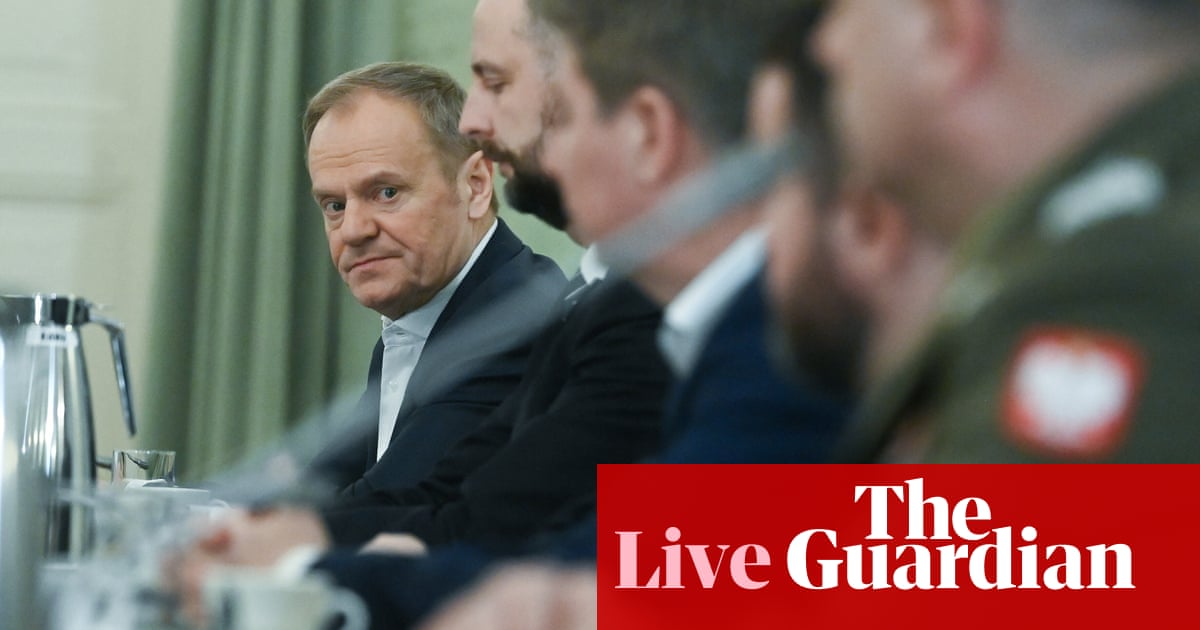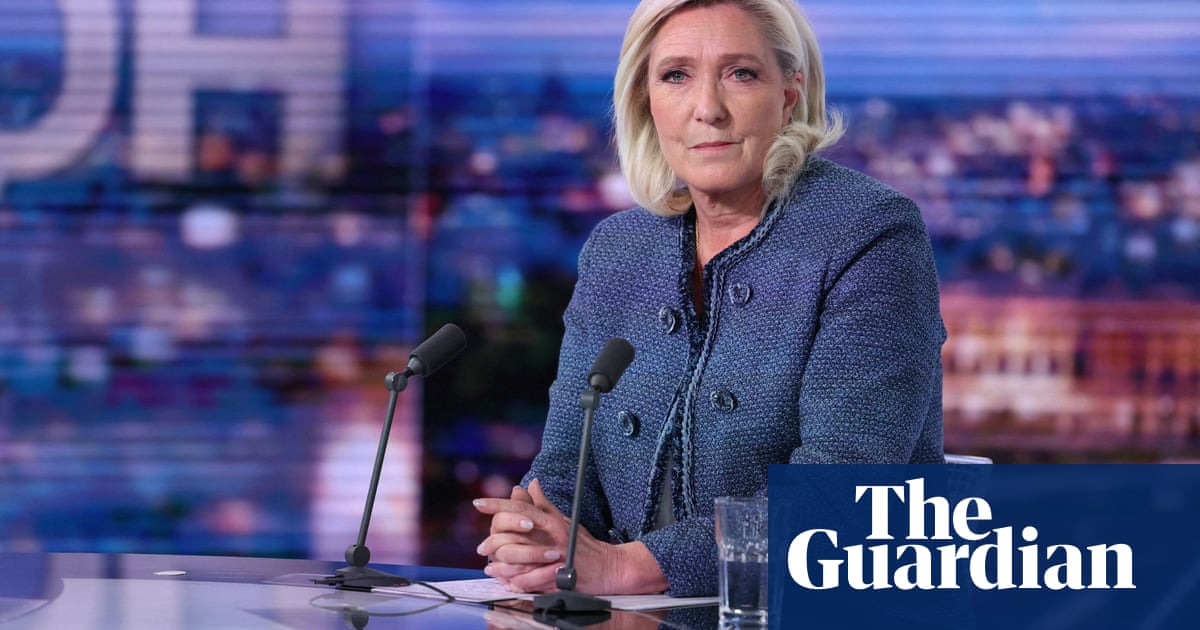Poland’s Tusk hints at London summit on defence on Sunday
Speaking alongside Costa, Polish prime minister Donald Tusk dropped a hint that there are plans for European leaders to meet in London this Sunday to discuss defence and security issues.
Here is what he said:
I hope that this greater [defence] mobilisation of Europe, of member states and Europe more broadly, will become a fact.
[Before meeting at the next European Council,] we will be in London on Sunday, together with our British friends and a group of leaders, to talk about these joint plans on defence.
It would make sense at the end of a week in which both Macron and Starmer meet Trump in Washington. One to watch.

Key events
-
Tesla sales in Europe fall after Musk’s involvement in politics
-
German coalition talks with SPD have begun, CDU/CSU’s Merz confirms
-
Germany’s Scholz met with election winner Merz
-
UK to raise defence spend to 2.5% from 2027, with 3% target in next parliament
-
We must ‘reject false choice’ between allies, Starmer says, as he talks of US importance for Britain
-
‘We must stand by Ukraine,’ UK’s Starmer says
-
Tusk’s comments on London summit – video
-
Poland’s Tusk hints at London summit on defence on Sunday
-
EU leaders to get debrief on Macron’s visit on Wednesday
-
Merz needs to change his tone, SPD co-chair warns
-
German business wants cuts in bureaucracy, faster approval, lower taxes – survey
-
Pope ‘slept well, all night,’ Vatican says
-
European charm offensive on Ukraine – what you need to know
-
Morning opening: No more GroKo
Tesla sales in Europe fall after Musk’s involvement in politics

Julia Kollewe
Sales of new Tesla cars almost halved in Europe last month, indicating waning demand for the US carmaker’s vehicles as its chief executive Elon Musk intervened repeatedly in the politics on both sides of the Atlantic.
The Texas-based carmaker sold 9,945 vehicles in Europe in January, down 45% from last year’s 18,161, according to data from the European Automobile Manufacturers’ Association (ACEA). Tesla’s share of the market dropped to 1% from 1.8%.
This could suggest that Musk’s interventions in European political affairs and senior role in Donald Trump’s administration defunding and depopulating the US government – including shutting down its aid programme – are leading to a consumer backlash.
Merz was also asked about the reported plans to change the constitutional debt break (11:27) and said it was “out of the question in the near future.”
He also talked about a potential one-off defence fund, reported by media, but said it was “too early to say anything about it now.”
In response to a question, he also insisted that he wanted to progress his plans for toughening the rules on migration and asylum – despite previous criticism on this point from the SPD.
“This is not an election campaign, not a tactical exchange of position. The majority of the population desperately wants an improvement … and it is our job … to meet these wishes,” he said.
Speaking alongside Merz, Söder insisted that the new government would have to focus on delivery as the only way of countering the rise of the far-right Alternative für Deutschland.
He welcomed the election outcome, saying that the ultimate failure of the Sahra Wagenknecht Alliance paved the way to a two-party coalition government, and saved the CDU/CSU from a three-way coalition.
German coalition talks with SPD have begun, CDU/CSU’s Merz confirms
Speaking before a parliamentary party meeting, Fredrich Merz has just confirmed that the coalition talks with the SPD over forming the next German government “have begun.”
“I cannot say anything about the content of the talks today, because it is far too early for that. But I assume we will intensify them in the next few days,” he said.
Merz will lead the talks together with CSU leader Markus Söder.
He stressed the new government would face “urgent” issues, and that is why he felt it was important to “enter into talks quickly.”
He once again repeated his three priorities – foreign and security policy, migration, and the economy – and intent to form the government by Easter, that is 20 April.
Germany’s Scholz met with election winner Merz
Meanwhile back in Germany, outgoing chancellor Olaf Scholz has met earlier today with his most likely successor, Friedrich Merz.
The German weekly Der Spiegel reported that the pair spoke for about 90 minutes, probably mostly about the transition phase between the current and the next government, but we don’t much more.
Merz is expected to arrive at a CDU/CSU meeting fairly soon, and so we may get to hear from him – if so, I will bring you all the key lines.
For example, regular readers of our Europe Live blog will know that Denmark announced its plans to increase defence spending by 50 bn kroner ($7bn) just last week, which is expected to bring overall spend to 3.2% GDP.
In a clear signal of the urgency, Danish prime minister Mette Frederiksen said last week that “there is one message for the chief of defence: Buy, buy, buy.”
Our Nordic correspondent Miranda Bryant covered the plan in detail:
As Reuters noted, Denmark’s defence spending was at just 1.4% in 2022, before Russia’s invasion of Ukraine.

Jakub Krupa
Starmer’s announcement of 2.5% GDP defence spend by 2027 would put the UK as the seventh highest spender (as a % of GDP) within Nato, according to 2024 figures collated by Nato and published by the British parliament.
Worth noting, however, that these figures seem to be slightly out of date, given rapid developments across the continent and a number of defence spending decisions made in recent months.
Polish leaders, for example, have been talking over the last week about the country spending 4.7% of GDP on defence, the highest % in the alliance.
UK to raise defence spend to 2.5% from 2027, with 3% target in next parliament
Starmer now talks about plans to “begin the biggest sustained increase in defence spending since the end of the cold war,” hoping to reach 2.5% (or 2.6% when counting new funding for intelligence and security services) GDP in 2027.
He wants to go beyond to 3% by the end of next parliament, so by 2033/34 at the latest.
We must ‘reject false choice’ between allies, Starmer says, as he talks of US importance for Britain
We must reject any false choice between our allies, between one side of the Atlantic or the other. That is against our history, country, and party because it’s against our fundamental national interest.
The US is our most important bilateral alliance. It straddles everything from nuclear technology to Nato to Five Eyes, Aukus, and beyond.
So this week when I meet President Trump, I will be clear. I want this relationship to go from strength to strength.
His comments strike a notably different tone to those of likely next German chancellor Friedrich Merz, who talked about the importance of reaching European independence on defence in his first comments after this Sunday’s election.
‘We must stand by Ukraine,’ UK’s Starmer says
UK prime minister Starmer is speaking now and reminds lawmakers of the UK’s role within Nato.
As a young man, I vividly remember the Berlin Wall coming down. It felt as if we were casting off the shackles of history, a continent united by freedom and democracy.
If you had told me then that in my lifetime, we would see Russian tanks rolling into European cities again, I would not have believed you.
Yet here we are in a world where everything has changed, because three years ago, that is exactly what happened.
He goes on:
We must stand by Ukraine, because if we do not achieve a lasting peace, then … the threats to our security, they will only grow.
You can follow the latest of his proposals for UK defence spending on our UK blog below, but I will bring you some key lines on European defence, too.
Tusk’s comments on London summit – video

Jakub Krupa










